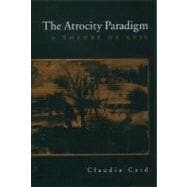
| Preface | p. vii |
| Abbreviations | p. xiii |
| The Atrocity Paradigm | p. 2 |
| Introduction: the Atrocity Paradigm | p. 3 |
| Nietzsche's Denial of Evil | p. 27 |
| Utilitarian Attack and Stoic Withdrawal: Two Extremes | p. 50 |
| Kant's Theory of Radical Evil | p. 73 |
| Prioritizing Evils Over Unjust Inequalities | p. 96 |
| Rape in War | p. 118 |
| Terrorism in the Home | p. 139 |
| The Moral Powers of Victims | p. 166 |
| The Moral Burdens and Obligations of Perpetrators | p. 188 |
| Gray Zones: Diabolical Evil Revisited | p. 211 |
| Notes | p. 235 |
| Index | p. 265 |
| Table of Contents provided by Publisher. All Rights Reserved. |
The New copy of this book will include any supplemental materials advertised. Please check the title of the book to determine if it should include any access cards, study guides, lab manuals, CDs, etc.
The Used, Rental and eBook copies of this book are not guaranteed to include any supplemental materials. Typically, only the book itself is included. This is true even if the title states it includes any access cards, study guides, lab manuals, CDs, etc.